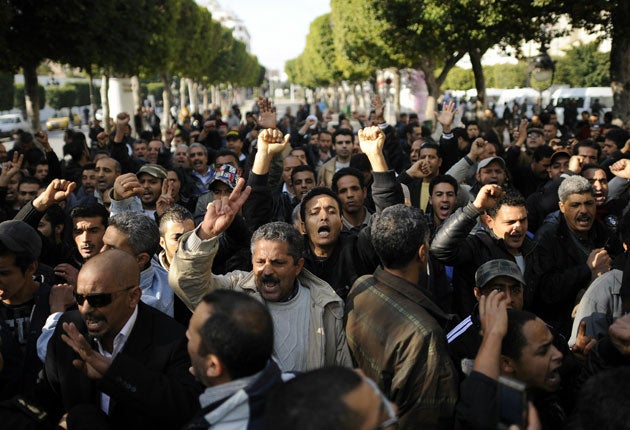New government begins with pledge to sweep away repression

A new government formed in Tunisia yesterday pledged the most wide-ranging reforms in the country's history in an attempt to end anti-government violence across the country that brought down the president.
Opposition politicians will join the government, parties banned under the former president Ben Ali will be allowed to operate and repressive laws will be swept away, said the Prime Minister, Mohamed Ghannouchi, who will lead the administration.
The media will be unshackled and there were reports that a prominent iconoclastic blogger will be appointed the Minister of Youth and Sport.
Despite the setting up the "national unity" coalition, three days after the authoritarian ruler Zine el-Abidine Ben Ali had fled into exile, there were fresh clashes in the streets with protesters refusing to accept members of the previous regime remaining in power. Police fired live rounds, tear gas and used water cannons to break up a demonstration by around 1,000 people insisting that the Constitutional Democratic Rally (RCD), Mr Ben Ali's party, should be banned from holding office.
Meanwhile it was announced that Lucas Dolega, a French photographer who was hit on the head by a gas cannister during protests on Friday, had died.
The demonstrators warned that their campaign will continue. Significantly, many of those on the rallies yesterday were older and from professional backgrounds. Tuoufi Tawil, a mergers and acquisitions manager, said: "We now have the Third Republic and its principles are freedom, democracy and tolerance. The RCD has shown that it does not believe in any of these."
Some opposition leaders also condemned the formation of the new government which will stay in charge until fresh elections are held in 60 days time.
Moncef Marzouki, of the centre-left Congress for the Republic, currently in exile in Paris, has announced that he will be a presidential candidate.
But, he said yesterday: "The new government is a farce. The three opposition parties have already functioned under the Ben Ali system and all the real forces that represent the country have been excluded.... Under this system the interior ministry will remain under the Ben Ali people and they will make sure their candidate gets in when the elections take place."
Mr Ben Ali's appointees will stay in other major ministries, including defence, foreign and finance. However, Najib Chebbi, founder of the opposition Progressive Democratic Party, will become the Minister for Regional Development. Two other senior opposition members will also get the posts of higher education and health.
Sidi Amamou, a blogger with a strong youth following, is expected to lead a revamped youth and sport department and a new governor, Mustapha Kamel Nabli, will become the head of the country's central bank which, it has been reported, allowed Mr Ben Ali's wife, Leila Trabelsi, to withdraw 1.5 tonnes of gold from the reserves before fleeing with her husband. The Ministry of Information, which had been in charge of censoring the media, will be abolished.
Mr Ghannouchi maintained that all efforts were being made to reflect diverse views in the new government and allow debate in the community. "We are committed to intensifying our efforts to re-establish calm and peace in the hearts of all Tunisians. Our priority is security, as well as political and economic reform" he said. "We have decided to free all the people imprisoned for their ideas, their beliefs or for having expressed dissenting opinions."
First Person
Tem Tem Ridha, writer, 23: 'We're pleased – but we're also scared'
There is in Tunisia now a great feeling of hope but also a feeling of fear and of shock. How could things have changed so quickly? How could the president simply have fled after so many years in power? People are pleased but they are also fearful.
It is important that the violence should end to allow the politicians and the trades unions leaders to do their work. The élites, both the old ruling clan and the opposition, must negotiate now to create a democratic Tunisia, a liberal Tunisia.
They must end the corruption, the outright theft, which has existed for so long. That is what the people want.
But first of all the people want security and they want food. They want to be able to go out on the streets without fear for their lives and they want the shops to reopen.
My fear – everyone's fear – is the corps of bodyguards that the president has left behind. It is they who are behind the sniping and the violence which breaks out at night.
We know what these people want. They want to create an atmosphere of terror so that the people begin to say "At least with president Ben Ali, we were safe on the streets". They want to create a mood which could allow the president to return.
It is important that these people be stopped. The army must do its work. It is important that the street demonstrations end. It is important that the shops should open to calm down ordinary people and give them a sense that normal life has returned.
But, most of all, I would say that the mood in Tunis today – in all of Tunisia – is a mood of exhilaration, of hope, of desire for the creation of a new, democratic Tunisia in which all Tunisians can share and be proud.
Join our commenting forum
Join thought-provoking conversations, follow other Independent readers and see their replies
Comments
Bookmark popover
Removed from bookmarks